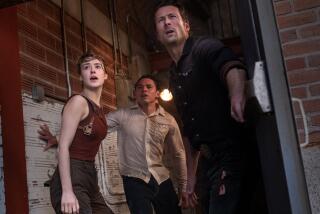Review: Cameron Crowe’s ‘Aloha’ has its charms despite some of its baggage

Mark Olsen reviews ‘Aloha’ starring Bradley Cooper, Emma Stone, and Rachel McAdams. Video by Jason H. Neubert.
It’s difficult to engage with writer-director Cameron Crowe’s new film, “Aloha,” without also acknowledging the bummer buzz that has preceded it.
The release date was delayed, the film was the subject of some inter-office trash-talking in the hacked Sony emails and more recently was attacked for its depiction (or lack thereof) of native Hawaiians and even the cultural sensitivity of its very title. Hoping to bolster his beleaguered romantic dramedy, Crowe made the unusual move of personally introducing the film’s lone screening for critics this week in L.A.
Now perceived as struggling and damaged, “Aloha” deserves better than all that. Even with its off-balance, overstuffed storytelling, the film maintains a charm and energy that never flags, with brisk pacing and generally engaging performances from its deep-bench cast.
INDIE FOCUS: Sign up for Mark Olsen’s newsletter about film
The word “Aloha” is commonly (and somewhat incorrectly) understood as both a greeting and a farewell. The movie itself is often at similar cross-purposes, wanting to be screwball and soulful, breezy and serious, while also trying to build an expanded world of sharp supporting characters around a central story of a spiritually lost man finding himself.
Bradley Cooper plays Brian Gilcrest, a military contractor and international corporate fixer. After a series of failed projects, including being wounded in Afghanistan, he finds himself being sent back to an Air Force installation in Hawaii where he has served before, working now for a megalomaniac industrialist (Bill Murray) to oversee the launch of a private satellite and its secret payload.
He is assigned a briskly enthusiastic young pilot, Allison Ng (Emma Stone), as his military watchdog/baby-sitter. It also turns out that an old flame, Tracy Woodside (Rachel McAdams), is living with her husband and family on the base. As shot by French cinematographer Eric Gautier, the film invokes a verdant dampness and lived-in feeling from the Hawaiian setting, instead of the more sunny, beachy quality of a picturesque travelogue.
Crowe, teenage rock journalist turned filmmaker, still has an air of the boy wonder about him even now in his late 50s. Which makes it all the more fascinating that so many of his films have circled the notion of failure, from Lloyd Dobler’s desire not to buy, sell or process in “Say Anything,” the sad-sack lovers of “Singles,” the mid-level rock ‘n’ rollers hitting their ceiling in “Almost Famous” to the main characters of “Jerry Maguire,” “Elizabethtown” and “We Bought a Zoo.”
Add Gilcrest to that list. Cooper’s character has a desperate sense of someone well aware of the edge over which he is about to fall (although the actor’s on-screen confidence at times undercuts this feeling).
Stone’s character is an amalgam of Renée Zellweger’s in “Jerry Maguire” and Kirsten Dunst’s in “Elizabethtown.” Stone wears well the angular crispness of her snappy hats and military uniforms, and it becomes a keenly self-aware running joke that the pale blond so frequently extols herself as one-quarter Hawaiian.
McAdams, meanwhile, plays likely the strongest, most rounded female character Crowe has ever written, a woman suddenly face to face with the life she has and the one she might have had, and the actress brings a grounded, unforced earthiness to the role that is a joy to watch.
Also in the top-flight cast are Alec Baldwin as a manic general, Murray’s tycoon besotted with the possibilities of his own power, John Krasinski as McAdams’ steady, quiet husband and Danny McBride as a goofball base administrator.
Dennis “Bumpy” Kanhele, a leader in the Hawaiian independence movement, plays himself, declaring Hawaii to be under military occupation while wearing a T-shirt that says “Hawaiian By Birth” on the front and “American By Force” on the back. (Whether that will quell the controversy about the film’s ethnic mix is open to question.)
“Aloha” likely has a few story strands too many, making it feel busy and hectic. It attempts to shoehorn in a spiritual rebirth for Cooper, who’s involved in a romantic triangle with Stone and McAdams, along with plot lines involving kids and the true motives of Murray regarding what’s on his about-to-launch satellite.
Like “How Do You Know,” the under-appreciated 2010 film by Crowe’s early-career mentor James L. Brooks, “Aloha” looks to walk a difficult tightrope between down-to-Earth reality and the lofty atmosphere familiar to Hollywood’s Golden Age comedies. It’s a tough balance to strike, as the dialogue can sparkle a bit too brightly or the pieces can come to seem a little too preciously set.
Yet what both Crowe and Brooks share most is an unending empathy for their characters, most especially when they are at their weakest and worst. The dialogue between Cooper and Stone or Cooper and McAdams has real verve, and Murray and Stone do a delightful dance to a Hall & Oates song (they should have used that scene for the trailer, instead of the one that left audiences confused).
With its unguarded emotions and romantic earnestness, “Aloha” seems out of touch with these times, its pre-release bad-luck run a sign of some core disconnect. Best to see “Aloha” as a messy, imperfect movie about messy, imperfect people, a film of moments and fleeting flashes that may not entirely add up but that are delightful on their own.
Follow me on Twitter at @IndieFocus and subscribe to my film newsletter
------------
‘Aloha’
Rating: PG-13 for some language including suggestive comments
Running time: 1 hour and 45 minutes
Playing: In general release
More to Read
Only good movies
Get the Indie Focus newsletter, Mark Olsen's weekly guide to the world of cinema.
You may occasionally receive promotional content from the Los Angeles Times.











